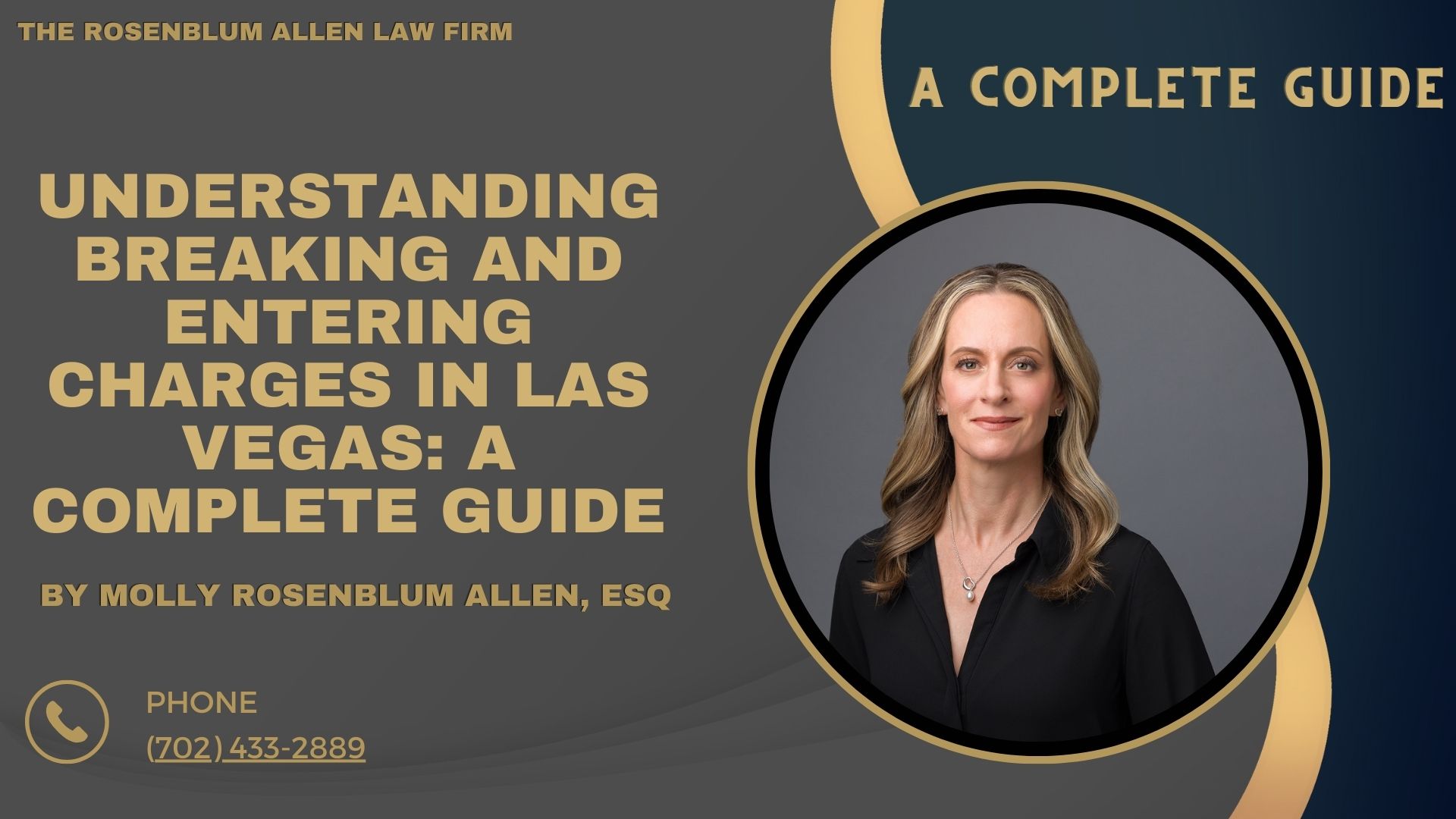Imagine coming home to find a window smashed. Someone tossing your things about is a clear sign of breaking. In Las Vegas, such incidents are not just distressing invasions of privacy. They are also serious crimes. This guide explains the legal details of breaking charges in Las Vegas. It emphasizes the key role of skilled lawyers in navigating these complex waters.
Definition of Breaking in Las Vegas
Breaking is often in movies, wrapped in drama. But, it’s not just about theft. Las Vegas has more unauthorized entries into buildings or properties. This is true regardless of the time of day.
Legal Definition and Statutes
In Nevada, they are breaking fall under the umbrella of burglary and trespassing laws. The legal definition hinges on entering a structure or property without permission. The intent is to commit a felony, theft, or assault inside.
Differences between Breaking, Burglary, and Trespassing
Breaking: Entering a property without consent, potentially intending to commit another crime.
Burglary: Entering a building with the specific intent to commit theft, assault, or any felony once inside.
Trespassing: Unlawfully entering or remaining on a property without the intent to commit another crime.
Understanding these differences is crucial for anyone facing charges. The legal consequences and defenses may vary a lot.

Types of Breaking Charges
The severity of a breaking charge in Las Vegas can vary. The circumstances of the crime determine the severity. This includes determining the intent and identifying if anyone stole or damaged anything.
Misdemeanor Breaking
This charge is often made when the intent to commit a further crime is not proven. Or, if the entry did not result in much harm or theft.
Felony Breaking
The charges become felonies if the breaking involved weapons. Or, if it caused major property damage. They also become felonies if there was intent to commit a serious crime like theft or assault.
Aggravated Circumstances Affecting Charges
Certain factors can intensify the severity of the charges, such as:
Use of weapons: Introducing a gun can elevate the charge to armed breaking, carrying stiffer penalties.
Presence of occupants: Breaking into an occupied dwelling can lead to more severe charges due to the potential threat to residents.
In Las Vegas, the gap between misdemeanor and felony charges greatly affects the legal strategy for a case. It also affects potential outcomes. An experienced defense attorney’s role is indispensable.

Legal Consequences of Breaking in Las Vegas
Facing breaking charges in Las Vegas is no small matter. The consequences stretch far beyond a slap on the wrist, potentially altering the course of your life. Let’s break down what you might be up against.
Penalties for Misdemeanor Charges
If your breaking charge is classified as a misdemeanor, here’s what you could be looking at:
Fines: These can be hefty, often reaching up to $1,000, hitting your wallet hard.
Possible Jail Time: You might be behind bars for up to 6 months, a significant time away from your life and loved ones.
Probation Conditions: If you’re on probation, expect to live under a microscope with regular check-ins and community service conditions.
Penalties for Felony Charges
Felony charges take the stakes even higher:
Prison Sentences: You could be looking at 1 to 10 years in state prison, depending on the specifics of your case.
Long-term Consequences: Beyond prison, a felony record can make it challenging to find employment, secure housing, or even vote.
Enhancements for Aggravated Circumstances
Certain factors can amplify your penalties:
Use of Weapons: Introducing a weapon into your breaking scenario can escalate your charges significantly.
Presence of Occupants: If someone was home during the incident, expect the legal system to take your charges much more seriously.

The Role of Intent in Breaking Charges
Intent is a crucial element in breaking cases. It’s not just about whether you entered; it’s about why.
Proving Intent in Court
The prosecution must prove you entered the property with a specific intent, such as committing theft or another felony. This is often the battleground where defense strategies challenge the prosecution’s narrative.
How Intent Affects the Severity of Charges
Your charges’ severity hinges on what you intend to do upon entering. Without clear intent to commit a further crime, your actions might be seen in a less severe light, potentially leading to lesser charges.

Defending Against Breaking Charges in Las Vegas
The right defense strategy can make all the difference when facing breaking charges. Let’s explore some common defenses:
Common Defense Strategies
Lack of Intent: This defense might apply if you didn’t intend to commit a crime upon entering.
Mistaken Identity: Sometimes, you’re mistaken for someone else in the wrong place at the wrong time.
Lawful Entry or Consent: If you had permission to enter or a reasonable belief that you did, this could be your defense.
The Importance of Evidence and Witness Statements
Gathering evidence and getting witness statements are crucial. They must support your version of events. This might include showing you had no intent to commit a crime or were elsewhere when the crime occurred.
Role of a Defense Attorney in Building a Strong Defense
A skilled defense attorney will navigate your case’s complexities. They will challenge the evidence against you and negotiate with prosecutors. Their expertise can be the key to a more favorable outcome.
Facing breaking charges in Las Vegas can feel like standing at the edge of an abyss. But, understanding the charges, potential consequences, and defense strategies can provide a lifeline. With the right lawyer, you can navigate these rough waters. You can work towards securing your future.

The Legal Process for Breaking and Entering Charges
Navigating the legal process in Las Vegas can feel like embarking on a journey through a labyrinth. Here’s a roadmap to help you find your way.
Arrest and Booking Process
The journey often starts with the arrest and booking process, where you’ll be taken to the police station, fingerprinted, and photographed. It’s a stark reminder that the situation is serious, but remember, it’s just the beginning of the process.
Initial Court Appearances and Bail Considerations
Soon after arrest, you’ll face your first court appearance, possibly a bail hearing. This is where the court decides if you can be released before trial and under what conditions. It’s a critical moment that can determine whether you prepare your defense from home or behind bars.
Pre-trial Motions and Negotiations
Before the trial, there’s a flurry of activity:
- Pre-trial Motions: Your attorney might file motions to dismiss charges or suppress evidence, shaping the battlefield.
- Negotiations: Sometimes, the best path forward is negotiating a plea deal. A seasoned attorney can be invaluable here, seeking terms that might include reduced charges or alternative sentencing.
Trial Process and Potential Outcomes
If your case goes to trial, it will unfold in several stages, from jury selection to presenting evidence and cross-examination. The outcome can range from acquittal to being found guilty of the charges. Each step is a critical piece of the puzzle, with your defense attorney guiding you through.

Impact of Prior Criminal History
Your past can cast a long shadow over your current breaking and entering charges. Here’s what you need to know.
How Prior Offenses Affect Current Charges
If you have a record, the court might see you as a repeat offender, which can influence everything from bail to sentencing. It’s like carrying a backpack full of bricks into your trial—every previous mistake adds weight.
Repeat Offenders and Enhanced Sentencing Guidelines
For those with prior convictions, the stakes are even higher. The law often mandates harsher sentences for repeat offenders, turning what might have been a misdemeanor into a felony, with longer prison terms on the line.

Potential for Plea Agreements and Diversion Programs
Finding a way through the storm sometimes means considering a plea agreement or qualifying for a diversion program.
Negotiating Plea Deals with the Prosecution
A plea deal can sometimes offer a silver lining—a way to reduce the charges or the sentence. It’s a negotiation, with your attorney arguing for the best possible terms based on the evidence and your circumstances.
Eligibility for Diversion Programs and Alternative Sentencing
Diversion programs offer a path to rehabilitation instead of punishment, focusing on treatment, education, and community service. Qualifying for these programs can be a game-changer, potentially leading to charges being dropped upon successful completion.

Restitution and Civil Remedies
The aftermath of breaking and entering isn’t just criminal charges. There’s also the matter of making things right with the victim.
Compensation for Victims of Breaking and Entering
Victims may seek restitution—a court-ordered payment from you to cover their losses. It’s a financial acknowledgment of the harm done, from property damage to stolen items.
Civil Lawsuits Against the Accused
Beyond criminal court, victims can file civil lawsuits seeking damages. It’s a separate battlefront where the stakes are financial, but the impact on your life can be just as significant.
Navigating breaking and entering charges in Las Vegas is a journey fraught with legal peril, but with the right guidance and understanding, it’s possible to emerge on the other side. Whether it’s strategizing a defense, negotiating the best possible outcome, or making restitution, each step requires careful consideration and effective advice. Remember, the path through the legal system is complex, but you don’t have to walk it alone.

Breaking It All Down
We are finishing this guide to navigating breaking charges in Las Vegas. We must reflect on the journey we’ve taken together. I have to break apart the sentence. Then, I will rewrite it as two sentences that flow well and each contain one idea. Each step has shown the importance of knowing the initial definitions and charges. It has also shown the importance of facing legal risks. It is important to navigating the complex legal process.
Summary of Key Points
Legal Definitions Matter: Knowing the difference between breaking, burglary, and trespassing can significantly impact your case’s outcome.
Consequences Are Serious: Whether facing misdemeanor or felony charges, a conviction’s repercussions can profoundly affect your life, from hefty fines and jail time to long-term implications on your career and personal life.
The Legal Process Is Complex: The legal journey is filled with critical moments and decisions from arrest to potential trial. Understanding each phase, from bail considerations to the trial and beyond, equips you with the knowledge to navigate these challenges.
Prior History and Negotiations Play a Role: Your past and the ability to negotiate effectively can significantly influence your case’s direction, affecting everything from plea deals to sentencing.
Restitution and Civil Remedies: The aftermath of breaking isn’t limited to criminal penalties. Financial restitution and civil lawsuits are also vital considerations, emphasizing the broader impacts of these charges.
The Importance of Experienced Legal Representation in Las Vegas
The guide’s key lesson is that a skilled defense attorney by your side is vital. Legal battles are tough. These cases are especially tough. They involve breaking charges in a city as vibrant and complex as Las Vegas. They demand a deep understanding of the law and a strategic, nuanced approach to defense.
A skilled attorney can tell the difference. It’s between a future limited by a criminal record and one where you get a second chance to rebuild. They bring their law expertise. They also have experience in negotiating the tricky Las Vegas legal system. They advocate for your rights and seek the best outcome for your case.
In the end, facing breaking charges in Las Vegas is a serious affair that can seem daunting. Yet, with the right preparation, knowledge, and legal help. You can confidently navigate this tough time. Remember, your choices now matter. They range from picking the right attorney to understanding. They also include joining in your defense. They can greatly impact your life’s path.
Use this guide to start. It will help you understand and face the charges. Do so with resilience and confidence based on information. The journey ahead may be hard. But, a path forward is always possible with the right support and guidance.

Frequently Asked Questions
What constitutes breaking in Las Vegas?
Breaking involves unauthorized entry into buildings or properties, regardless of the time of day, with the intent to commit a crime.
How does breaking differ from burglary and trespassing?
Breaking entails entering a property without consent, potentially intending to commit another crime, while burglary involves entering a building with the intent to commit theft or assault, and trespassing refers to unlawfully entering or remaining on a property without the intent to commit another crime.
What are the potential consequences of breaking charges in Las Vegas?
Breaking charges can result in fines, jail time, probation, and long-term consequences such as difficulty finding employment or housing, depending on the severity of the charges.
What factors can affect the severity of breaking charges?
The presence of weapons, damage to property, and intent to commit a serious crime like theft or assault can escalate breaking charges to felonies with harsher penalties.
How does intent play a role in breaking charges?
Intent is crucial in determining the severity of charges, with clear intent to commit a further crime resulting in more severe consequences.
What are some common defense strategies against breaking charges?
Common defenses include lack of intent, mistaken identity, and lawful entry or consent, supported by evidence and witness statements.
What is the legal process for handling breaking charges in Las Vegas?
The legal process involves arrest, court appearances, pre-trial motions, negotiations, trial, and potential outcomes ranging from acquittal to conviction.
How does a prior criminal history impact breaking charges?
Prior offenses can influence bail, sentencing, and the severity of charges, potentially leading to enhanced penalties for repeat offenders.
What are plea agreements and diversion programs, and how do they affect breaking charges?
Plea agreements offer reduced charges or sentences through negotiation, while diversion programs focus on rehabilitation instead of punishment, providing alternative paths to resolution.
What are restitution and civil remedies in the context of breaking charges?
Restitution involves compensating victims for losses, while civil lawsuits seek damages beyond criminal penalties, emphasizing the broader impact of breaking charges.

Glossary
Background Check: A process used by employers, landlords, and others to verify an individual’s criminal history, employment history, and other critical information before making decisions such as hiring or leasing.
Conviction: The formal declaration that someone is guilty of a criminal offense, typically made by a jury’s verdict or a judge’s decision in a court of law.
Criminal Record: A record of a person’s criminal history, indicating past convictions, charges, and sometimes arrests, depending on the jurisdiction.
DUI (Driving Under the Influence): The act of operating a motor vehicle while impaired by alcohol or drugs to a level that renders the driver incapable of driving safely.
Expungement: The process of legally deleting, sealing, or destroying criminal records, making them inaccessible through the state or federal repositories.
Felony: A category of crime that is more serious than a misdemeanor, often punishable by imprisonment for more than one year, a fine, or both.
Infraction: Minor violations or petty offenses less serious than misdemeanors, often resulting in a fine without jail time.
Misdemeanor: A criminal offense less severe than a felony and more serious than an infraction, often punishable by fines, community service, probation, or short-term imprisonment.
Petty Theft: The theft of property of low value, considered a less severe theft charge and often classified as a misdemeanor.
Public Intoxication: A legal charge against individuals found in a public place while under the influence of alcohol or drugs to the degree that they may endanger themselves or others.
Record Sealing: The process of concealing records of criminal convictions from the public view. Certain government agencies can sometimes access sealed records but are unavailable through standard background checks.
Repeat Offenses: Multiple criminal offenses committed by the same individual, especially if they are similar.
Trespassing is knowingly entering another person’s property without permission, a criminal offense.
Vandalism: Deliberately destroying or damaging property belonging to someone else, often considered a criminal offense.

Additional Resources for You
Criminal Defense Attorneys: Specializing in defending individuals and companies charged with criminal activity. More Info
Las Vegas DUI Lawyer: Expertise in defending against DUI (driving under the influence) charges. More Info
Domestic Violence Lawyer Las Vegas: Specializes in defending against domestic violence charges. More Info
Drug Possession Lawyer: Offers defense strategies for individuals charged with drug possession. More Info
Sex Crimes Attorney: Provides legal defense for those accused of sex crimes. More Info
CPS Defense Attorney: Focuses on defending against child abuse and neglect accusations. More Info
Misdemeanor Lawyer: Offers legal services for individuals facing misdemeanor charges. More Info
Las Vegas Warrant Defense Attorney: Specializes in defense against arrest warrants. More Info
Las Vegas Probation Violation Attorney: Provides legal representation for probation violation cases. More Info
Theft Crime Defense Lawyer: Defends against theft-related charges. More Info
Kidnapping Lawyers: Offers legal defense for kidnapping charges. More Info
Juvenile Defense Lawyers: Specializes in legal defense for juveniles. More Info
Firearms Lawyer Las Vegas: Provides legal representation for firearms-related charges. More Info
This comprehensive list showcases the Rosenblum Allen Law Firm’s extensive capabilities in criminal defense across a broad spectrum of charges, from DUIs and drug possession to more specific areas like juvenile defense and firearms law. Each link leads directly to a page providing further details on the firm’s services in that particular area, making it easy for potential clients to find the help they need.

Outside Resources for You
American Bar Association (ABA): A national network providing support, resources, and education to the legal profession and the public. Visit ABA
National Association of Criminal Defense Lawyers (NACDL): An organization aimed at ensuring justice and due process for persons accused of crime or misconduct. Visit NACDL
FindLaw: A comprehensive resource for legal information, including free legal advice and a directory of law firms across the United States. Visit FindLaw
Avvo: Provides a directory of lawyers by area of practice and location, along with reviews and legal advice. Visit Avvo
Justia: Offers free case law, codes, regulations, legal articles, and legal blog databases, as well as community resources. Visit Justia
Nevada State Bar: The official site for the Nevada State Bar provides resources for the public and attorneys, including legal resources, licensing, and continuing education. Visit Nevada State Bar
Southern Nevada Legal Aid: A nonprofit organization dedicated to providing legal assistance and advocacy to those in need in the Southern Nevada area. Visit Southern Nevada Legal Aid

A Special Message from Our Lead Attorney, Molly Rosenblum Allen, Esq

Dear Valued Reader,
Thank you for reading our guide. It covers navigating breaking and entering charges in Las Vegas. We understand the complexities and challenges of facing legal charges. Our mission is to give you accurate, helpful information to assist in your time of need.
At The Rosenblum Allen Law Firm, we believe in the power of effective legal defense. It can make a big difference in the lives of those we represent. Our team shows dedication. We commit to providing personalized, strategic legal advice. It is tailored to your unique situation.
If you or someone you know is facing legal challenges, please contact us. You can schedule a free consultation. Please call us at (702) 433-2889 to speak directly with a member of our team. This first meeting will help us understand your case better. It will show how we can help navigate the legal system together.
Thank you again for your trust and time. We look forward to the opportunity to assist you.
Warmest regards,
Molly Rosenblum Allen, Esq.
The Rosenblum Allen Law Firm




